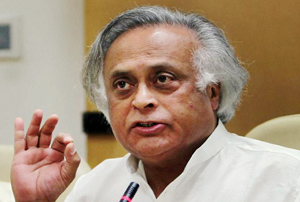Hyderabad, May 21: Asserting that the Bihar Assembly polls will be the "third nail" in BJP's coffin, senior Congress leader Jairam Ramesh exuded confidence on the prospect of all "secular forces" joining hands to defeat the saffron party in the politically crucial battle.
"Bihar elections would be the third nail in BJP's coffin. First nail was Delhi (Assembly) elections and the second nail was the Land Acquisition Bill," Ramesh told media here.
On the uncertainty over the merger of Janata Parivar outfits, seen as key factor in the state, before the polls in Bihar later this year, the Congress veteran said, "lot of shadow-boxing goes on."
He, however, hastened to add, "I am sure ultimately all the secular forces will get together to ensure that the BJP gets the treatment it deserves in Bihar."
Also, hitting back at Union Minister Venkaiah Naidu, who recently sought to know from the Congress as to why the provision for special category status was not included in the Andhra Pradesh Reorganisation Act of 2014, Ramesh said the BJP leader was "inventing new excuses" on that.
"I will ask Venkaiah Naidu why the provision of special category status was not part of the Reorganisation Bill of Uttar Pradesh in 2000. UP was reorganised into UP and Uttarakhand in 2000. Special category status was given to Uttarakhand in 2002. Why was it not part of the Bill?" he asked.
"These (according special status to AP) are executive decisions. So, same principle that applied to Atal Behari Vajpayee (the then PM) is being applied to Manmohan Singh also. The Cabinet decided that special category status should be given to AP. Venkaiah Naidu is trying to find excuses," Ramesh said.
"He (Naidu) knew that Manmohan Singh was going to make the commitment on 20th February of 2014. But Venkaiah Naidu also knows that Prime Minister Narendra Modi has gone back on the commitment. He is trying to invent new excuses," the Congress leader alleged.
Ramesh said AP is "very much" qualified for the special status as revenues from Hyderabad were not being apportioned between the state and Telangana, and there was going to be revenue deficit for AP for at least five years. The special status is needed to compensate for that.





Comments
Add new comment